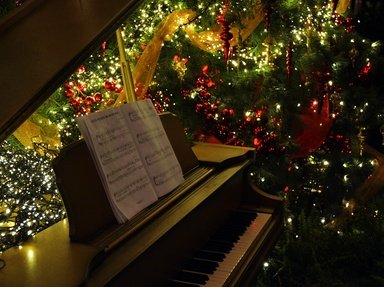Quiz Answer Key and Fun Facts
1. 'Hajej, Nynjej' is one of the carols featured in the Christmas play in 'Jo Returns to the Chalet School'. In English, it is known as the 'Rocking Carol'. From which country does it come?
2. The melody of the spring carol 'Tempus adest Floridum' is used as the basis for a fictional carol written by the Chalet School's headmistress, Madge Russell, in 'Exploits of the Chalet School Girls'. In real life, the melody was also used for which Christmas carol, named after a Bohemian saint?
3. The Christmas play in 'The Mystery at the Chalet School' features a carol about a dish that you might not usually associate with Christmas. It is in both Latin and English and features the chorus 'Caput apri defero/Reddens laudus Domino'. More modern versions might mention a 'fowl' or poultry instead, but what was the original dish featured in the song? (Hint: think of sausages wrapped in bacon.)
4. The 'Chalet School' books feature carols and songs in many different languages, in keeping with the school being multinational. All of these carols are featured in Christmas plays in different books, and are in different languages, but which two share the same melody?
5. 'O Jesulein süss, o Jesulein mild' features in the play in 'Shocks for the Chalet School', and is translated as 'O wee Jesus sweet, o wee Jesus mild'. Which German Baroque composer, whose other works include the 'St Matthew Passion', 'Magnificat' and 'Mass in B minor', composed it?
6. Several carols featured in the 'Chalet School' books are about the coming of the Magi, or the three kings, and one carol that appears twice in the series is 'The Three Kings', a carol by the German composer Peter Cornelius, which uses the hymn 'Wie schön leuchtet der Morgenstern ('how brightly shines the morning star')' as an accompaniment and counterpoint. By which name is this carol also known?
7. In 'Shocks for the Chalet School', one of the carols featured in the play, in a scene with King Herod, is called 'King Herod and the Cock'. What happens in the carol?
8. 'Jo of the Chalet School' features the school's first Christmas play, and one of the songs featured is one of the German-speaking world's most famous carols: 'Stille Nacht, Heilige Nacht'. In English, we know it as 'Silent Night'. Joseph Mohr wrote the lyrics, but who composed the melody?
9. 'Exploits of the Chalet Girls' features the carol 'Lullay, Thou Little Tiny Child', named for the carol's refrain of 'by, by, lully, lullay'. By which name is this carol more commonly known? (Hint: you wouldn't want to send someone there!)
10. No Christmas concert at the Chalet School is complete without a rendition of 'Adeste Fideles'. In Britain, it's a popular choice for carol concerts, but not in its Latin form - you're more likely to hear the English version. What is the English counterpart of 'Adeste Fideles'?
Source: Author
Kankurette
This quiz was reviewed by FunTrivia editor
agony before going online.
Any errors found in FunTrivia content are routinely corrected through our feedback system.
